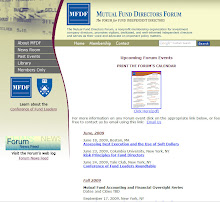At a recent speech before the New York City Bar, Robert Khuzami, Director of the SEC's Division of Enforcement, took the opportunity to reflect on changes an initiatives in his division since he took the lead. He highlighted the increased pace of enforcement activity, noting that:
Khuzami reported that he'd also streamlined management and internal processes in his division to speed up and make more efficient the investigations the Division pursues.
During his address, Khuzami highlighted some of the Division's higher profile investigations, like those involving Countrywide, Reserve Management Company, the Stanford Group, Bank of America, GE, and others.
The full text of Robert Khuzami's August 5, 2009 address before the New York Bar is available at: http://www.sec.gov/news/speech/2009/spch080509rk.htm
Comparing the period from late January to the present to roughly the same period in 2008, the Division has opened 10% more investigations (approximately 525, compared to 475); has been granted 118% more formal orders (which grants us subpoena power) (275, compared to 126); has filed 147% more TROs (52, compared to 21); and has filed nearly 30% more actions (397, compared to 306).Embracing the criticisms of the effectiveness of the SEC's enforcement efforts, Khuzami told his audience that he had implemented a new enforcement philosophy:
In addition to his new philosophy, Khuzami also started a program whereby specialized enforcement units are being created to "provide the structure and resources for staff to "get smart" about certain products, markets, regulatory regimes, practices and transactions." The program will start with five specialized units:
- First, to be as strategic as possible. This means a focus on cases involving the greatest and most immediate harm and on cases that send an outsized message of deterrence.
- Second, to be as swift as possible. A sense of urgency is critical. Long gaps between conduct and atonement undermine the deterrent impact of our cases, and result in missed opportunities to achieve a permanent change in behavior and culture.
- Third, to be as smart as possible. Our resources are finite and critically limited. We must better determine on an informed basis whether to continue an investigation, who to continue it against, how to shape it and how to charge it.
- And last, to be as successful as possible. This means building strong cases so that defendants settle quickly on the Commission's terms or face a trial unit armed with compelling evidence.
- Asset management,
- Market abuse,
- Structured and new products,
- Foreign Corrupt Practices Act, and
- Municipal securities
Khuzami reported that he'd also streamlined management and internal processes in his division to speed up and make more efficient the investigations the Division pursues.
These initiatives — flattening of management and more streamlined process and procedure — are designed to achieve one goal — to move our cases more quickly and to free up time and resources to take on new matters with greater urgency and impact.The Division has also created an Office of Market Intelligence, designed to collect, analyze, and triage tips and complaints, making referrals to the proper investigative staff at the Commission. This new office will also liaise with the other divisions to coordinate the staff's efforts to address tips and complaints identifying wrongdoing.
During his address, Khuzami highlighted some of the Division's higher profile investigations, like those involving Countrywide, Reserve Management Company, the Stanford Group, Bank of America, GE, and others.
The full text of Robert Khuzami's August 5, 2009 address before the New York Bar is available at: http://www.sec.gov/news/speech/2009/spch080509rk.htm





